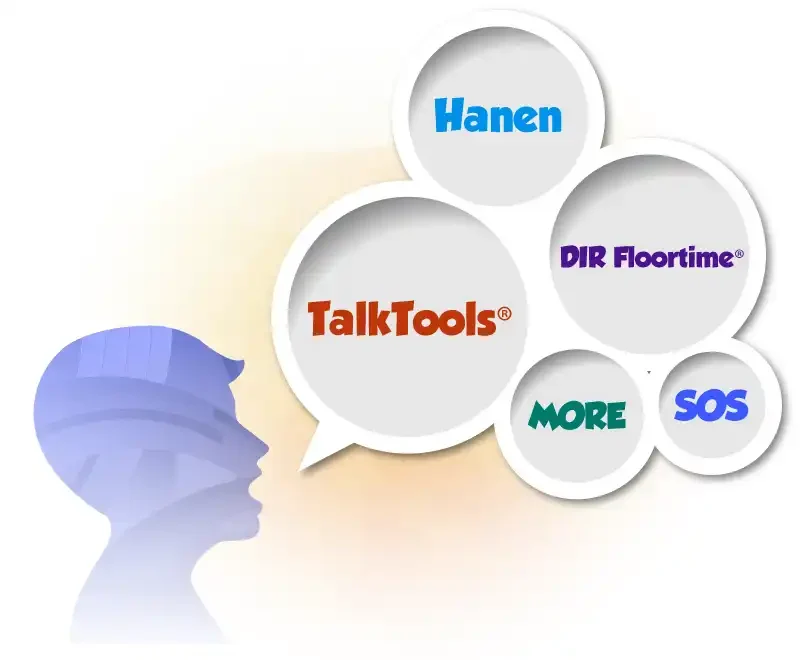Every child is different, and therefore we provide an individualized intervention plan. We maximize progress in speech, language and communication by combining the most recent evidence based research and treatment methods.

We maximise the child’s progress in speech, language and communication by combining the latest and most effective treatment methods. Our Speech-Language Therapists are trained and experienced in a variety of popular treatment modalities, which include:
- Hanen Programs
- It Takes Two To Talk
- More Than Words
- TalkAbility
- Social Thinking
- PECS (Picture Exchange Communication System)
- DIR Floortime®
- Sequential Oral Sensory (SOS) Approach to Feeding
- Lidcombe Program
- Nuffield Dyspraxia Program
- PROMPT
- TalkTools®
Key collaborations are important in the child’s therapeutic journey at Dynamics Speech. We strongly believe that parents and caregivers play a vital role in the success of the child’s therapy. They can provide support and reinforcement in learning when the child is at home. As such, we actively partner with the child’s parents and/or primary caregivers and support them through parent training, relevant resources and maintain regular and open communication throughout the child’s therapy.
We also ensure the child receives integrated care and support, if needed, through seamless and effective collaborations with Dynamics’ in-house multidisciplinary team of healthcare professionals.
| Age | Language | Speech | Social and Play | Eating and Drinking |
|---|---|---|---|---|
| 3-6 months | Turns head towards voice. Babbling | Makes cooing sounds. | Attempts to interact with an adult. | Breast or bottle feeding, they should be putting their hands on the bottle during feeding. |
| 6-9 months | Waves "bye bye". Imitates syllables. | Babbles with sounds like "puh", "mi" etc. | Vocalises to get attention. | Finger feeding solids and they will help caregiver with spoon. |
| 9-12 months | Gives objects on request. Uses 1-2 words. | Babbles longer sounds like "mimi" "baba" etc. | Joint attention starts developing. | Drinks from a cup held by the caregiver, eats a variety of foods and deliberately reaches for the spoon. |
| 12-18 months | Understands 50 words. Uses 15 meaningful words. | Speech should be 25% intelligible. | Points, shows or gives objects. | Holds a spoon and a cup with both hands for self-feeding, stops using baby bottle. |
| 18-24 months | Understands new words rapidly. Uses 50 words. | Says p, b, m, n, w sounds in words. Speech should be 50% intelligible. | Joint attention is well established. | Drinks using a straw, able to self-feed and eat a variety of textured foods. |
| 2-3 years | Understands 2-3 step instructions. Uses 2-3 word sentences. | Says k, g, t, d, h sounds in words. Speech should be 75% intelligible. | Parallel play with other children. | Holds a cup with 1 hand without spilling and uses a fork, eats a variety of solid foods and is not a fussy eater. |
| 3-4 years | Responds to "wh" questions. Tells you what they have been doing. | Can produce all sounds except sh, ch, j, th, r. Speech should be 90-100% intelligible. | Uses a doll as a play mate. | Self feeds a variety of foods and drinks and is able to use a knife and fork. |
| 4-5 years | Follows 4-5 step instructions. Vocabulary of 1500 words. Uses a variety of grammatical structures. | Can produce all sounds except th, sh, r. | Engages in role-play and co-operative play. | Self feeds a variety of foods and drinks. |
| 5-7 years | Identifies and describes element of a story. Compares and contrasts old and new information. | Can produce all sounds except th, r. | Understands jokes. | Self feeds a variety of foods and drinks. |
We recommend you contact us if you have any concerns regarding your child’s speech, language and/or feeding development.
Get Started
Are you an awesome Speech Therapist?